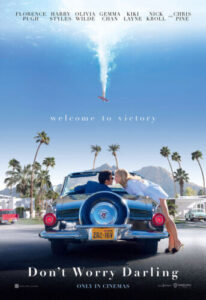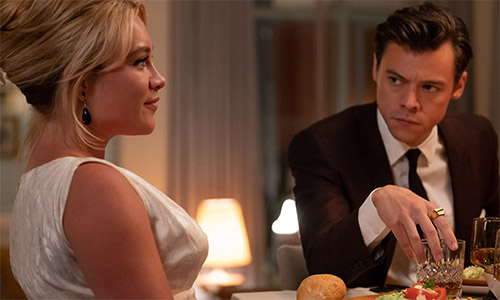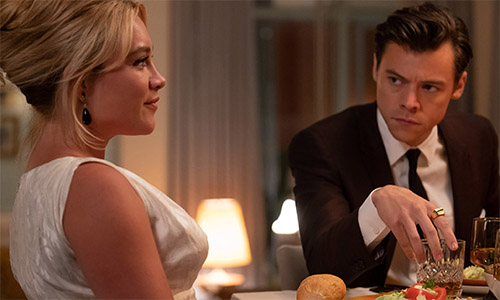 Don’t Worry Darling, Olivia Wilde’s (Booksmart) may have been the most talked about movie of the year. While the film garnered much buzz, it was the much-publicized dysfunction between some cast members (most notably Wilde and Florence Pugh) and different versions of why Shia Labeouf exited from his role (he said/she said story from he and Wilde) and how it played out in the reputable news outlets, as well as the tabloids and social media. There was much worry that Wilde’s second directorial effort would be known for the hoopla around the film rather than the film itself. With a production budget of $35 million (compared to just $6 million for Booksmart), I’m sure Wilde felt considerable pressure for her film to succeed. Despite its lukewarm ratings among critics, 39% on Rotten Tomatoes, it has resonated with audiences (82%). While not a perfect movie, I was thoroughly engrossed in the setting, the characters, and where the story would lead.
Don’t Worry Darling, Olivia Wilde’s (Booksmart) may have been the most talked about movie of the year. While the film garnered much buzz, it was the much-publicized dysfunction between some cast members (most notably Wilde and Florence Pugh) and different versions of why Shia Labeouf exited from his role (he said/she said story from he and Wilde) and how it played out in the reputable news outlets, as well as the tabloids and social media. There was much worry that Wilde’s second directorial effort would be known for the hoopla around the film rather than the film itself. With a production budget of $35 million (compared to just $6 million for Booksmart), I’m sure Wilde felt considerable pressure for her film to succeed. Despite its lukewarm ratings among critics, 39% on Rotten Tomatoes, it has resonated with audiences (82%). While not a perfect movie, I was thoroughly engrossed in the setting, the characters, and where the story would lead.
As Don’t Worry Darling progressed, I found myself comparing it more and more to a slew of films. Wilde, Katie Silberman’s screenplay, drew in elements from films such as The Truman Show, The Village, Shutter Island, The Adjustment Bureau, Inception, Minority Report, The Matrix, The Master, Gone Girl, mother!, and television shows such as Lost, Mad Men, and The Stepford Wives. That is quite an array of programs, but I felt various components of each at least once. However, Don’t Worry Darling felt wholly original, much like Booksmart did differently.
I went into this movie knowing very little about the plot. It was only the day before that I saw its genre was mystery/suspense. So, I thought it would be much more of a drama. I then assumed it would be a movie like Gone Girl or Girl on a Train. And while there were some similarities, the premise of Don’t Worry Darling was quite different. The film opens with a party scene in which several attractive, 30-something-aged couples are having a merry time while drinking martinis and looking lovey-dovey like a bunch of college-aged students looking to hook up at a frat party. It feels as if Wilde was setting a certain tone in this opening scene, though it’s one that we never return to again.
 The setting for Don’t Worry Darling is an idyllic 1950s town in some rural territory in the southwestern United States (perhaps northern Arizona or southern California, though it doesn’t matter). A group of forward-thinking families has settled in a planned neighborhood community that allows them to create a society free from cultural norms. Frank(Chris Pine – Unstoppable, Hell or High Water), the founder of Victory Town, and his wife Shelley (Gemma Chan – Crazy Rich Asians, Let Them All Talk) remind the town, “It’s a different way. A better way,” to reinforce a shared vision of community and togetherness.”
The setting for Don’t Worry Darling is an idyllic 1950s town in some rural territory in the southwestern United States (perhaps northern Arizona or southern California, though it doesn’t matter). A group of forward-thinking families has settled in a planned neighborhood community that allows them to create a society free from cultural norms. Frank(Chris Pine – Unstoppable, Hell or High Water), the founder of Victory Town, and his wife Shelley (Gemma Chan – Crazy Rich Asians, Let Them All Talk) remind the town, “It’s a different way. A better way,” to reinforce a shared vision of community and togetherness.”
Each day, the men leave their homes at precisely the same time and drive through the desert to Victory Headquarters. They work in technology but aren’t allowed to say much about their jobs, even to their wives. Meanwhile, the wives clean the house, tend to the children, enjoy classes such as ballet, spend time eating lunch, shopping, gossiping, enjoying the some, and preparing dinner to prepare when their husbands arrive home. All of the couples are, eerily, extremely happy. How can many married couples be so joyous that we don’t see a single disagreement?
The couple we spend time with are Alice (Florence Pugh – Midsommar, Fighting With My Family) and Jack (Harry Styles – Dunkirk, My Policeman). While some couples do have children, Alice and Jack do not. This couple is so infatuated that they are on one long, extended honeymoon. Why can’t we all have this idealized relationship where dinner can wait until after a welcome-home-from-work sexual encounter on the dining room table?
 Pugh, who broke into mainstream media with her performance in Midsommar and followed it up with a Best Supporting Actress Oscar nomination for Little Women, is the best part of a movie with many great things going for it. She aggressively immerses herself in Alice. We sometimes forget that we are watching an absolute master of her craft and someone who can lift the performances of those around her. The dashing Styles has the visual allure, but he needs the acting prowess to match Pugh. When the scenes are gentler, there isn’t a noticeable difference. The more intense the scene, the more I pictured and wished for LaBeouf. While her performance did not need lifting, LaBeouf would have elevated the entire movie. He has the range that the inexperienced Styles does not and would have been able to portray far better the extremes of Jack’s character, particularly in the third act.
Pugh, who broke into mainstream media with her performance in Midsommar and followed it up with a Best Supporting Actress Oscar nomination for Little Women, is the best part of a movie with many great things going for it. She aggressively immerses herself in Alice. We sometimes forget that we are watching an absolute master of her craft and someone who can lift the performances of those around her. The dashing Styles has the visual allure, but he needs the acting prowess to match Pugh. When the scenes are gentler, there isn’t a noticeable difference. The more intense the scene, the more I pictured and wished for LaBeouf. While her performance did not need lifting, LaBeouf would have elevated the entire movie. He has the range that the inexperienced Styles does not and would have been able to portray far better the extremes of Jack’s character, particularly in the third act.
I can see why critics might harp on Don’t Worry Darling. A critic who watches films as their career might be able to pick apart the plot, perhaps even identify the ending long before it happens, or think they know where the film is going, only to be correct and ultimately disappointed. Or maybe a critic thinks Wilde’s vision was too grandiose and fails to deliver on her setup. Or perhaps they felt that a movie that initially appeared tightly wound unravels at the seams in its final act.
For the everyday filmgoer, this is a neat movie with a slow build or a mystery disguised as something much more lighthearted. Wilde takes us on her “wild” ride, rewarding its attention-paying audiences with a product that borrows many components of well-known films but still one that builds intrigue and holds interest. I left the movie and thought about it for hours afterward, wondering if I understood all of what Wilde was trying to convey and satisfied if I successfully comprehended most of it. So don’t let the critics dissuade you. If most of the other movies or television shows I mentioned in this review are ones you like, I can’t think of why Don’t Worry Darling wouldn’t be the same.
Plot 9.5/10
Character Development 9/10
Character Chemistry 8.5/10
Acting 8/10
Screenplay 9.5/10
Directing 9/10
Cinematography 10/10
Sound 10/10
Hook and Reel 10/10
Universal Relevance 8/10
91.5%